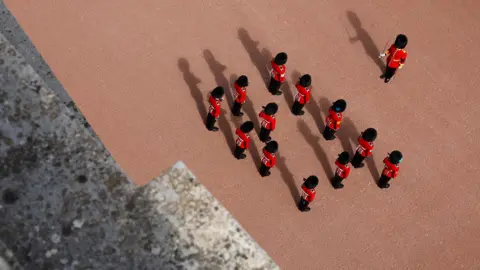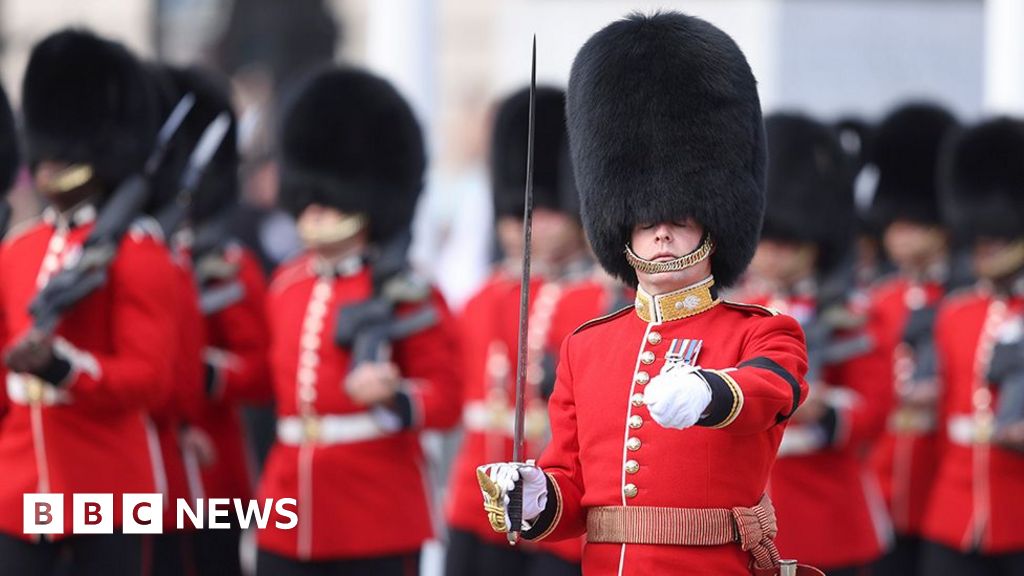 AFP
AFPThe bearskin caps worn by soldiers outside Buckingham Palace now cost more than £2,000 each, figures from the Ministry of Defence (MoD) show.
The cost of the ceremonial caps, made from the fur of black bears, soared by 30% in a year, according to figures revealed in response to a Freedom of Information request from animal welfare campaigners.
The People for the Ethical Treatment of Animals (Peta) group are against using real fur in principle, but they say it is also now a financial as well as an ethical issue, with £1m spent on fur caps in recent years.
The MoD said: “We are open to exploring faux fur alternatives if they pass the necessary requirements.”
However, the ministry spokesman said a fake fur version would have to satisfy “safety and durability considerations” and that “no alternative has met all those criteria to date”.
The sharp increase in price is explained by the MoD as the result of a change in the “contractual arrangements” for the caps, which are all made from the fur of bears hunted in Canada.
The cost of the caps worn by the King’s Guard rose from £1,560 each in 2022 to £2,040 in 2023.
Elisa Allen, of Peta, called on the MoD to “stop wasting taxpayer pounds on caps made from slaughtered wildlife, and switch to faux fur today”.
The distinctive tall caps are worn on ceremonial events such as Trooping the Colour, and the figures from the MoD show that 24 new caps were bought in 2023 and 13 in 2022. Over the past decade the amount spent on replacement caps has been more than £1m.
Defenders of using real fur caps have argued that they are long-lasting and maintain their appearance for such showcase military occasions.
Animal welfare campaigners have claimed it is cruel and unnecessary for the King’s Guard to use real fur, saying it takes the fur of one bear to make each bearskin.
The decision on the use of real fur is up to the MoD rather than the royals, but as the BBC previously revealed, Queen Camilla switched this year to only buying fake fur clothes, saying in a letter she would “not procure any new fur garments”.
There has been criticism from Peta of how black bears are caught and killed, with accusations that hunters can use crossbows, and the animals might suffer for a long time.
However, the MoD says all of the fur it uses comes from legal and licensed hunts from the regulated Canadian market, and that bears are not “hunted to order” to make the caps.
There are fake fur alternatives on offer to make the caps, including a fabric made from synthetic fibres – proposed by Peta.
But the MoD is not yet convinced that fake fur meets the five tests it has set for a bearskin alternative, in terms of its comfort and keeping its shape in all types of weather.
Those tests are “water absorption, penetration, appearance, drying rate and compression”.
In opposition, Labour’s then-shadow defence minster Stephanie Peacock had called for “an immediate review of the possible alternatives to bear fur, taking an in-depth look at contracts and costs”.
She had told the House of Commons: “It is incredibly important that traditions develop and adapt if they are to survive.”
With Labour now in government, the MoD says it is open to considering fake fur alternatives and would welcome the submission of samples of materials for testing.



